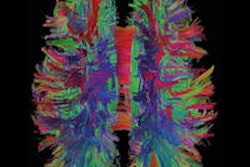Wednesday, December 4 | 10:40 a.m.-10:50 a.m. | SSK16-02 | Room N230
In this scientific session, researchers from the Mayo Clinic in Rochester, MN, will discuss how to use in vivo MR elastography (MRE) to measure how Alzheimer's disease and frontotemporal dementia change mechanical properties of the brain."Measures of brain elasticity have the potential to offer insights into the ultrastructural alternations of brain tissue that occur with [Alzheimer's and frontotemporal dementia], how these change with time, and the clinical expression of the diseases," state Dr. John Huston III and colleagues from Mayo's department of radiology in their RSNA 2013 abstract.
In the study, 59 subjects received MRE using a 3-tesla scanner: 39 were age- and gender-matched cognitively normal controls, 15 had Alzheimer's disease, and five had frontotemporal dementia.
MRE data were collected with a modified spin-echo echo-planar imaging (EPI) pulse sequence, including full head coverage, in less than seven minutes. In study participants with 3-mm isotropic sampling, the researchers measured age-adjusted global brain stiffness of the entire brain, excluding the cerebellum, in eight regions.
Huston and colleagues found decreased global stiffness in Alzheimer's subjects, compared with healthy controls, as well as differences in stiffness among individuals with frontotemporal dementia. Regional differences were most prominent in the frontal lobes and the temporal lobes, according to the researchers.
The clinical benefit is that "MRE with other biomarkers may offer an earlier diagnosis of dementia and response to potential therapies," Huston told AuntMinnie.com.
The Mayo researchers plan to continue with longitudinal studies to determine how brain stiffness changes with the clinical onset of Alzheimer's disease and frontotemporal dementia.


.fFmgij6Hin.png?auto=compress%2Cformat&fit=crop&h=100&q=70&w=100)





.fFmgij6Hin.png?auto=compress%2Cformat&fit=crop&h=167&q=70&w=250)











